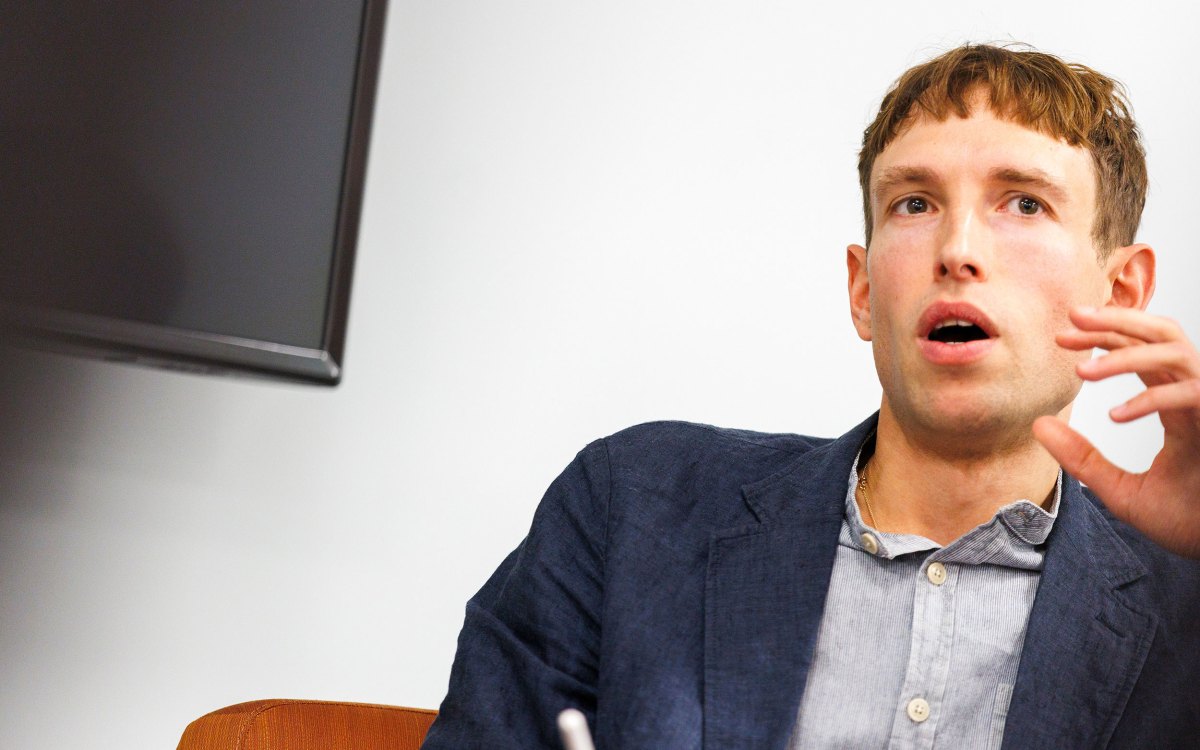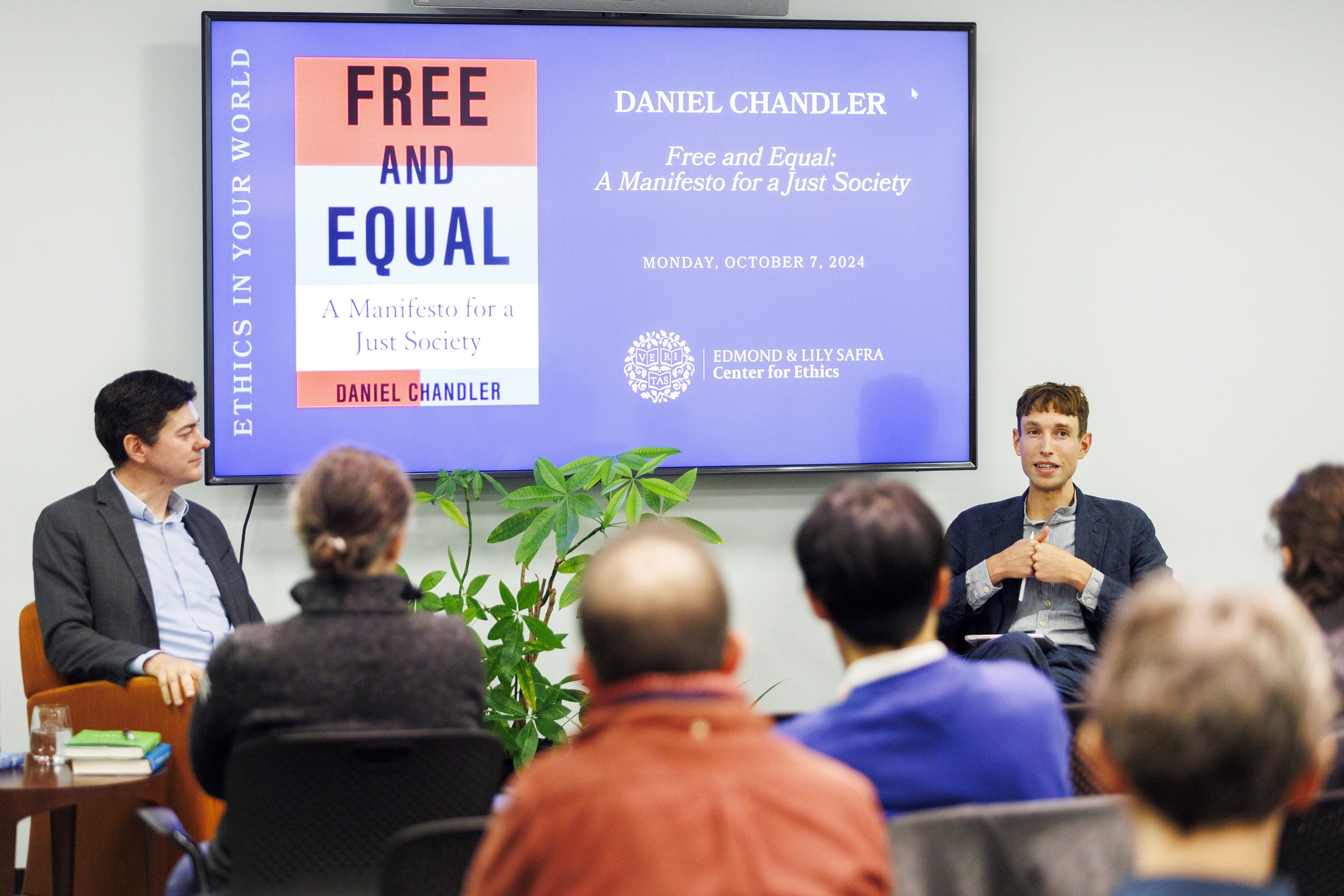Many nations around the globe appear deeply divided, with dissatisfaction over democracy on the rise. The central issues are rooted in the “very real failings” of liberal democratic institutions today, according to Daniel Chandler.
“It’s surprisingly hard to find a coherent vision of what a truly just society, grounded in [classical] liberal principles, would actually look like,” said Chandler, an economist and philosopher at the London School of Economics, during a talk Monday with Eric Beerbohm, director of the Safra Center for Ethics at Harvard.
The pair discussed Chandler’s new book, “Free and Equal: A Manifesto for a Just Society,” in which he defends the ideas of the late John Rawls, the renowned 20th century Harvard political philosopher, and attempts to apply them to the economic and political issues of today.
The book offers a full-throated defense of liberal egalitarianism, as Rawls outlined it, and then tries to “bridge the gap between Rawls’ quite abstract, high-level principles and a whole range of practical policy questions,” Chandler said.
Rawls was a deeply influential political, moral and legal philosopher who taught at Harvard from 1962 until his death in 2002 and is best known for his 1971 opus, “A Theory of Justice.”
His theory of “justice as fairness” envisions a society in which every person has an equal right to the basic liberties and opportunities, and where inequalities exist, those with the least power or advantage should be prioritized. And he begins with a thought experiment: Would we design a more just society if nobody knew in advance whether they’d be among the most powerful or the most vulnerable?
Chandler was first inspired to explore this question while he was at Harvard in 2008 on a one-year Henry fellowship. He wondered why economics and political theory appeared to have drifted apart for progressives since Rawls’ heyday and whether he could find a way to reunite them.
One objective of the book, he explained, was to offer an accessible summary of Rawls’ ideas to a non-academic public and to address some of the common criticisms and misunderstandings about him.
“I think one of the reasons Rawls hasn’t had as much influence as he might have had on public policy is that he said so little about the practical implications of his ideas,” he said.
“I particularly wanted to bring out some of the communitarian aspects of Rawls’ thinking, and to emphasize how his account of economic justice is much richer and also much more radical than his commons.”
“I particularly wanted to bring out some of the communitarian aspects of Rawls’ thinking, and to emphasize how his account of economic justice is much richer and also much more radical than his commons,” essentially his views on sharing of societal resources.
In Rawls’ view, economic justice involves more than how wealth is distributed, but about the balance of power between workers and business owners and the importance of having a sense of financial independence and opportunity.
A secondary goal was to respond to critics of classical liberalism, which embraces individual freedom as a primary value, and try to “rehabilitate” it as a progressive public philosophy.
“I think in popular discourse, particularly on the left, liberalism has come to be associated with the neoliberal ideas of thinkers like [Friedrich] Hayek and [Milton] Friedman,” with their faith in the markets and singular focus on economic growth.
That kind of thinking has come to dominate political discourse and economic policy since the 1980s, Chandler notes in his book. It has left progressives without a solid philosophical mooring for their thinking and policies.
Whereas President Ronald Reagan and Prime Minister Margaret Thatcher could look to Hayek and Friedman in the 1980s for a source of intellectual coherence and direction, it’s not as obvious today where progressives look for similar inspiration, he added.
“The long-term failure of mainstream progressive parties, like the Democrats here [in the U.S.] and the Labour Party in the UK, to develop a coherent political vision of their own” is not merely an intellectual problem, but it deeply undermines the parties’ chances for ongoing electoral success, Chandler said.
Rawls, Chandler believes, offers a useful framework for weaving an array of different policies together in a coherent way and provides an intellectual and ethical clarity about why we should pursue progressive policy ideas like workplace democracy or universal basic income or various forms of participatory democratic politics.
Not everyone will agree with Chandler’s point of view, but for politicians and others looking for justifications of certain policies, that clarity could have significant practical value. “Being able to explain why we support different policies is important, and Rawls can help us do that.”
More like this
-
 Nation & World
Nation & WorldU.S. seems impossibly riven. What if we could start from scratch?
Key would be focusing on social, political, economic fairness, according to new book on ideas of political philosopher John Rawls
6 min read
Source link

